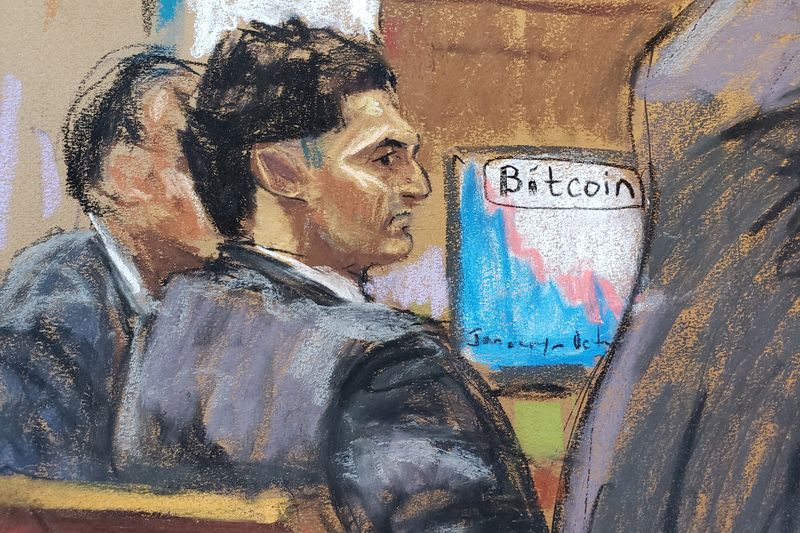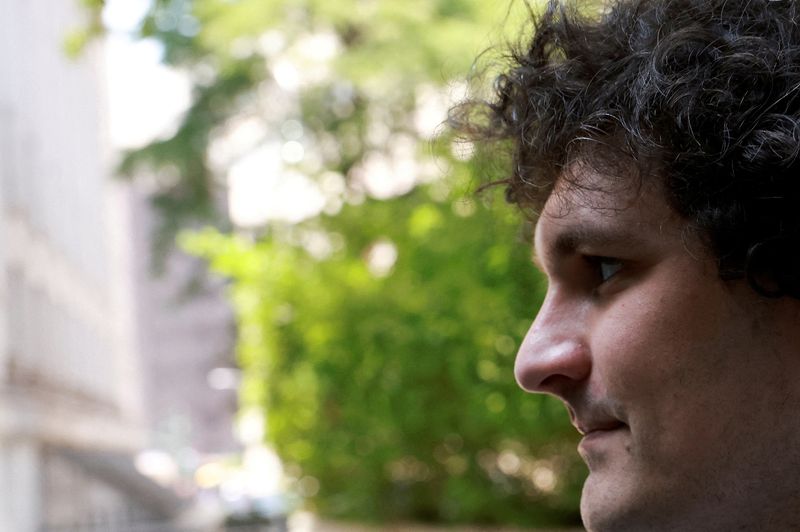By Luc Cohen, Jody Godoy
NEW YORK (Reuters) -Sam Bankman-Fried's lawyers and federal prosecutors clashed on Wednesday in opening statements over whether the former billionaire's FTX cryptocurrency exchange collapsed due to "massive" fraud by its founder or errors in business judgment.
Bankman-Fried, 31, has pleaded not guilty to charges he used FTX customer money from the exchange's 2019 launch until its November 2022 bankruptcy in order to prop up his hedge fund, Alameda Research, buy luxury real estate, and donate to U.S. political campaigns and candidates.
The trial kicked off with jury selection on Tuesday, nearly a year after the collapse of FTX shocked financial markets and tarnished the budding entrepreneur and philanthropist's reputation as an honest actor in a crypto sector prone to scams and purported get-rich-quick schemes.
In his opening statement on Wednesday, defense lawyer Mark Cohen portrayed the Massachusetts Institute of Technology physics graduate as a "math nerd" who overlooked risk management in building FTX, but did not steal customer money.
Cohen acknowledged that FTX lent money to Alameda, but said Bankman-Fried "reasonably believed" that those loans were permitted and backed up by collateral. He said some key aspects of FTX's business, such as risk management, were "overlooked" as the startup grew rapidly.
"Sam and his colleagues were building the plane as they were flying it," Cohen said. "No one person - no one CEO, certainly not Sam, could be everywhere and do everything."
But prosecutor Thane Rehn said Bankman-Fried took more than $10 billion from unsuspecting FTX customers, and that he "doubled down" when Alameda's risky investments in cryptocurrency began to lose money in May and June of last year.
"All of it was built on lies," Rehn said. "He was using his company, FTX, to commit fraud on a massive scale, and the money he was spending to build his empire - it was money he was stealing from FTX customers."
JURORS TO HEAR FROM INNER CIRCLE
Prosecutors are expected to call three former members of Bankman-Fried's inner circle - former Alameda chief executive Caroline Ellison and former FTX executives Nishad Singh and Gary Wang - to testify against him. All three have pleaded guilty and agreed to cooperate with prosecutors.
"They will give you an insider's view of how the crimes occurred," Rehn said in his opening statement, without naming the witnesses.
Cohen suggested they may "spin" Bankman-Fried's good-faith decisions that they agreed with at the time as deceitful in hindsight. He also said Bankman-Fried urged Ellison to hedge Alameda's crypto bets, but that she did not.
"Here in the real world, cooperation means testifying against Sam in a way that will help the government's case," Cohen said.
Jurors are expected to hear from Wang by the end of the week, another prosecutor, Danielle Sassoon, said in court.
Earlier on Wednesday, a jury of 12 primary members and six alternates was selected from a pool of residents of Manhattan, the Bronx, and New York City's northern suburbs. The group includes a retired investment banker, a school librarian and a train conductor.
Bankman-Fried's parents, Stanford Law School professors Joseph Bankman and Barbara Fried, were seen arriving at the federal courthouse in Lower Manhattan on Wednesday morning. They had not attended the trial's first day.

Once known for his casual attire and mop of unkempt curls, Bankman-Fried sported a trim haircut and wore a suit and tie in court on both Tuesday and Wednesday.
He has been detained at the Metropolitan Detention Center in Brooklyn since Aug. 11, when U.S. District Judge Lewis Kaplan jailed him for likely tampering with witnesses, including by sharing Ellison's private writings with a reporter. Bankman-Fried and Ellison were at times romantic partners.
